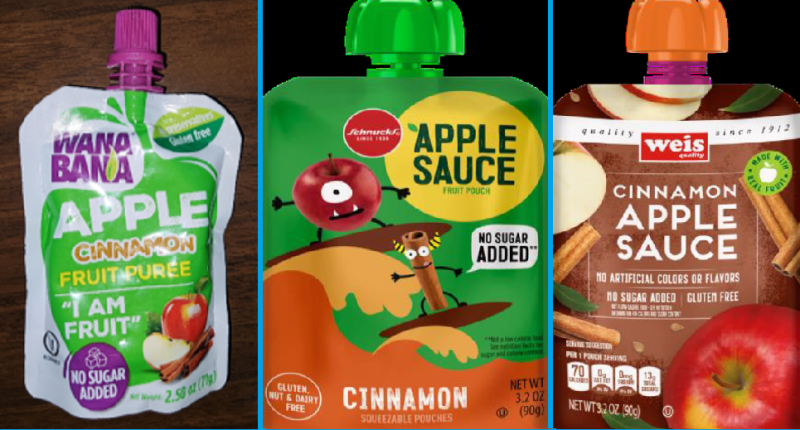Update to article originally posted January 30, 2024. (Original article follows.)
As of February 13, 2024, FDA has not received any additional confirmed complaints/reports of adverse events potentially linked to recalled product. To date, confirmed complainants, or people for whom a complaint or adverse event was submitted and met FDA’s complainant definition, are between zero and 53 years of age and the median age is one year old.
CDC’s National Center for Environmental Health is conducting case finding efforts in collaboration with state and local health departments. CDC’s case definition for state partners includes a blood lead level of 3.5 µg/dL or higher measured within 3 months after consuming a recalled WanaBana, Schnucks, or Weis brand fruit puree product after November 2022. As of February 9, CDC has received reports of 101 confirmed cases, 284 probable cases, and 37 suspected cases for a total of 422 cases from 44 different states through their reporting structure. For more information, please visit CDC’s page to review their case reporting methodology and findings.
CDC and FDA have different data sources, so the counts reported by each agency will not directly correspond. In addition, some people who were affected by the contaminated product might be reflected in both the numbers reported by the FDA and the numbers reported by CDC, so the numbers should not be added together.
FDA’s investigation is ongoing to determine the point of contamination and whether additional products are linked to illnesses. FDA has no indication that this issue extends beyond these recalled products and does not have any confirmed reports of illnesses or elevated blood lead level adverse events reported for other cinnamon-containing products or cinnamon.
Previous updates not captured by the initial timeline below are in the Previous Updates section. FDA will update the advisory as information becomes available.
Update to article originally posted January 30, 2024. (Original article follows.)
Investigation of Elevated Lead & Chromium Levels: Cinnamon Applesauce Pouches
Update to original post: January 30, 2024
(NOTE: Original post follows update.)
Ecuadorian officials in Agencia Nacional de Regulación, Control y Vigilancia Sanitaria (ARCSA) have reported that Carlos Aguilera of Ecuador, the processor of the ground cinnamon supplied by Negasmart to Austrofoods and later used in recalled apple cinnamon products, is the likely source of contamination and is not in operation at this time. Additionally, according to ARCSA, the unprocessed cinnamon sticks used in recalled products were sourced from Sri Lanka and were sampled by ARCSA and found to have no lead contamination. ARCSA’s investigation and legal proceedings to determine ultimate responsibility for the contamination are still ongoing.
The FDA has limited authority over foreign ingredient suppliers who do not directly ship product to the U.S. This is because their food undergoes further manufacturing/processing prior to export. Thus, the FDA cannot take direct action with Negasmart or Carlos Aguilera.
FDA has no indication that this issue extends beyond these recalled products and does not have any confirmed reports of illnesses or elevated blood lead level adverse events reported for other cinnamon-containing products or cinnamon.
As of February 5, 2024, FDA has not received any additional confirmed complaints/reports of adverse events potentially linked to recalled product. To date, confirmed complainants, or people for whom a complaint or adverse event was submitted and met FDA’s complainant definition, are between zero and 53 years of age and the median age is one year old.
CDC’s National Center for Environmental Health is conducting case finding efforts in collaboration with state and local health departments. CDC’s case definition for state partners includes a blood lead level of 3.5 µg/dL or higher measured within 3 months after consuming a recalled WanaBana, Schnucks, or Weis brand fruit puree product after November 2022. As of February 2, CDC has received reports of 100 confirmed cases, 277 probable cases, and 36 suspected cases for a total of 413 cases from 43 different states through their reporting structure. For more information, please visit CDC’s page to review their case reporting methodology and findings.
CDC and FDA have different data sources, so the counts reported by each agency will not directly correspond. In addition, some people who were affected by the contaminated product might be reflected in both the numbers reported by the FDA and the numbers reported by CDC, so the numbers should not be added together.
Original Post…
No consuma, venda ni sirva las múltiples marcas de bolsas de puré de fruta con manzana y canela retiradas del mercado. La FDA continua la investigación...
Producto
Productos de puré de manzana y puré de manzana y canela retirados del mercado. Puede encontrar información sobre códigos de lote y UPC en el anuncio de retirada de la empresa.
- Bolsas de puré de fruta con manzana y canela de la marca WanaBana retiradas del mercado
- Bolsas de puré de manzana con sabor a canela y paquetes variados de la marca Schnucks retiradas del mercado
- Bolsas de puré de manzana y canela de la marca Weis retiradas del mercado
Síntomas de la toxicidad por causa del plomo
El plomo es tóxico para los humanos y puede afectar a personas de cualquier edad o condición de salud. Proteger a los niños de la exposición al plomo es particularmente importante porque son más susceptibles a la toxicidad del plomo. La mayoría de los niños no presentan síntomas inmediatos evidentes. Los padres y cuidadores deben consultar a un proveedor de atención médica si sospechan que un niño puede haber estado expuesto al plomo. La exposición a corto plazo al plomo podría provocar los siguientes síntomas: dolor de cabeza, dolor o cólico abdominal, vómitos, anemia. La exposición a largo plazo podría provocar los siguientes síntomas adicionales: irritabilidad, letargo, fatiga, dolores musculares o comezón o ardor en los músculos, constipación, dificultad para concentrarse o debilidad muscular, temblor, pérdida de peso.
Tiendas afectadas
- Las bolsas de puré de fruta con canela y manzana de la marca WanaBana se venden a nivel nacional y están disponibles a través de varias tiendas minoristas, incluyendo Amazon, Dollar Tree y otros puntos de venta en línea.
- Las bolsas de puré de manzana con sabor a canela y los paquetes variados de la marca Schnucks se venden en las tiendas de comestibles Schnucks y Eatwell Markets.
- Las bolsas de puré de manzana y canela de la marca Weis se venden en las tiendas de comestibles Weis.
Estado de la investigación: en curso. Se proporcionarán actualizaciones de este aviso a medida que estén disponibles.
Recomendación
- Los consumidores no deben consumir, vender ni servir bolsas de puré de manzana y canela de las marcas WanaBana, Schnucks o Weis retiradas del mercado y deben desecharlas.
- Estos productos tienen una larga vida útil. Los consumidores deben revisar sus despensas en hogar y desechar estos productos.
- Para desechar adecuadamente el producto, los consumidores y minoristas deben abrir con cuidado la bolsa y vaciar el contenido en un bote de basura antes de desechar el empaque para evitar que otros recuperen el producto retirado de la basura. Limpie cualquier derrame después de desechar el producto y luego lávese las manos.
- Comuníquese con su proveedor de atención médica si cree que puede tener síntomas de toxicidad por causa del plomo después de consumir bolsas de fruta retiradas del mercado.
- La mayoría de los niños no presentan síntomas inmediatos evidentes de exposición al plomo. Si existe la sospecha de que un niño pudo haber estado expuesto al plomo, los padres deben hablar con el proveedor de atención médica de su hijo para que le haga un análisis de sangre.
- Para los médicos, consulte las notificaciones de la Red de Alerta de Salud (HAN) de los Centros para el Control y la Prevención de Enfermedades (CDC, por sus siglas en inglés) y de la Actividad de Comunicación y Difusión Clínica de los CDC (COCA Now) para obtener asesoramiento sobre cómo brindar la mejor atención médica a los pacientes que estuvieron potencialmente expuestos al plomo o al cromo al consumir productos retirados del mercado.
- Si usted o su hijo presentan síntomas o exposición a este producto, también puede presentar una queja o reporte de evento adverso (enfermedad o reacción alérgica grave).
Product
Recalled cinnamon apple puree and applesauce products. Information on lot codes and UPCs can be found in the firm’s recall announcement.
- Recalled WanaBana apple cinnamon fruit puree pouches – including three packs
- Recalled Schnucks-brand cinnamon-flavored applesauce pouches and variety pack
- Recalled Weis-brand cinnamon applesauce pouches
At this time, the FDA does not have any evidence that this issue extends beyond the recalled products.
Symptoms of Lead Toxicity
Lead is toxic to humans and can affect people of any age or health status. Protecting children from exposure to lead is particularly important because they are more susceptible to lead toxicity. Most children have no obvious immediate symptoms. Parents and caretakers should consult a healthcare provider if you suspect a child may have been exposed to lead. Short term exposure to lead could result in the following symptoms: headache; abdominal pain/colic; vomiting; anemia. Longer term exposure could result in the following additional symptoms: irritability; lethargy; fatigue; muscle aches or muscle prickling/burning; constipation; difficulty concentrating/muscular weakness; tremor; weight loss.
Stores Affected
- WanaBana apple cinnamon fruit puree pouches are sold nationally and have been available through multiple retailers, including Amazon, Dollar Tree, Family Dollar/Dollar Tree combination stores, and other online outlets.
- Schnucks-brand cinnamon-flavored applesauce pouches and variety pack are sold at Schnucks and Eatwell Markets grocery stores.
- Weis-brand cinnamon applesauce pouches are sold at Weis grocery stores.
Status
Ongoing; updates to this advisory will be provided as they become available.
Recommendation
- Consumers should not eat, sell, or serve recalled WanaBana, Schnucks, or Weis-brand apple cinnamon pouches and should discard them.
- These products have a long shelf life. Consumers should check their homes and discard these products.
- To properly discard the product, consumers and retailers should carefully open the pouch and empty the content into a trash can before discarding the packaging to prevent others from salvaging recalled product from the trash. Clean up any spills after discarding the product then wash your hands.
- Contact your healthcare provider if you think you or your child may have symptoms of lead toxicity after eating recalled fruit pouches.
- Most children have no obvious immediate symptoms of lead exposure. If there’s suspicion that a child may have been exposed to lead, parents should talk to their child’s healthcare provider about getting a blood test.
- For clinicians, please refer to the Centers for Disease Control and Prevention’s (CDC) Health Alert Network (HAN) and CDC’s Clinician Outreach and Communication Activity (COCA Now) announcements for guidance on how to best care for patients who were potentially exposed to lead or chromium by consuming recalled products.
- If you or your child have symptoms or exposure to this product, you can also file a complaint or adverse event report (illness or serious allergic reaction).






